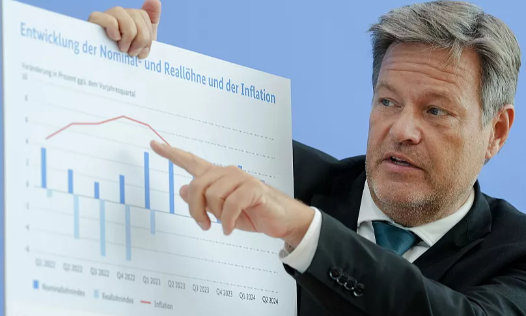Payment is being processed. Please do not refresh or close this page until your payment is complete.
 Book an Appointment
Book an Appointment

Germany's economic downturn deepens with a projected contraction in 2024, marking its second consecutive year of decline. Manufacturing struggles and global competition, especially from China, highlight structural issues. Growth is expected to return in 2025.
Germany's economic woes are continuing, with the country now facing the spectre of closing 2024 in recession.
On Wednesday, German Economy Minister Robert Habeck announced that the economy is expected to shrink by 0.2% this year, down from earlier forecasts of a 0.3% growth and marking the second consecutive year of contraction.
This bleak outlook makes Germany the only G7 economy projected to contract in 2024, a continuation of its 0.3% decline in 2023.
The downturn reflects the country's prolonged structural challenges, including reliance on its manufacturing sector and the adverse effects of global competition, particularly from China.
Hope for recovery in 2025
Despite the gloomy near-term outlook, the German government predicts that the economy will return to growth in 2025, with the gross domestic product expected to increase by 1.1%, slightly up from the earlier forecast of 1.0%. By 2026, growth could reach 1.6%, driven primarily by an upturn in private consumption and stabilising inflation.
These projections, however, are contingent on the successful implementation of structural reforms and the stabilisation of global economic conditions.
According to Habeck, the implementation of a comprehensive growth package of 49 measures is crucial. These measures aim to revitalise the economy by fostering investment, enhancing productivity, and addressing long-standing structural issues.
Habeck stressed that if this plan is successfully enacted, "the economy will be stronger, and more people will come back to work," but its success hinges on the support of both houses of parliament, including the opposition-controlled Bundesrat.
On the inflation front, the government has revised its projections.
Inflation is expected to fall to 2.2% in 2024 from 5.9% last year, with further reductions anticipated in the following years, stabilising at 1.9% by 2026.
These falling inflation rates, alongside wage increases and tax relief, are seen as pivotal in reviving private consumption, which could drive modest economic growth in 2025.
Structural challenges persist
Germany's economic struggles are compounded by bleaker projections from the ifo Institute, which has emphasised that the nation's economy is "stuck in crisis." According to the institute, both cyclical and structural factors are weighing heavily on Germany’s growth prospects.
"The German economy is stuck and languishing in the doldrums, while other countries are feeling the upswing," said Prof. Dr. Timo Wollmershäuser, deputy director at the ifo Institute.
He attributes the malaise to a combination of factors, including decarbonisation, digitalisation, demographic shifts, and geopolitical upheavals such as the energy price shock and China's changing role in the global economy.
Source: https://www.euronews.com/business/2024/10/09/germanys-economic-struggles-deepen-a-back-to-back-recession-looms